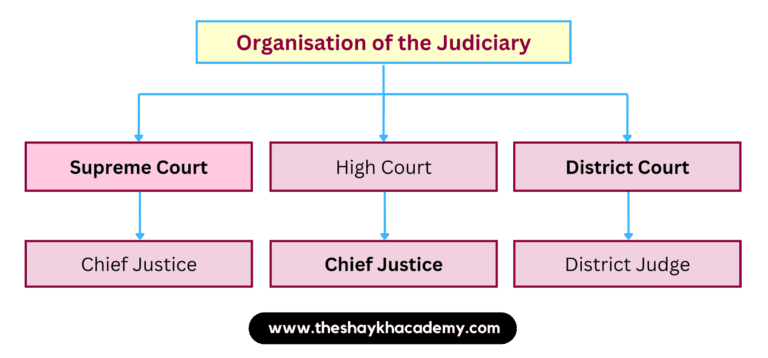Chapter 4 - The Indian Judicial System
1. Choose the correct option and complete the statements.
(1) Laws are made by …………… .
(a) Legislature
(b) Council of Ministers
(c) Judiciary
(d) Executive
Ans: Option (a) – Legislature
(2) The Chief Justice of Supreme Court is appointed by ……………
(a) The Prime Minister
(b) The President
(c) The Home Minister
(d) The Chief Justice
Ans: Option (b) – The President
2. Explain the concepts.
(1) Judicial Review
Ans:
(i) The Constitution is the fundamental law of the nation, and protecting it is the prime responsibility of the Supreme Court.
(ii) The Parliament cannot pass any law that violates the Constitution.
(iii) Every act or policy made by the executive should be consistent with the Constitution.
(iv) If any law passed by the Legislature or any act of the Executive violates any provision of the Constitution, the said law or act is declared illegal.
(v) So, it is struck down by the Supreme Court.
(vi) This power of the Supreme Court is known as judicial review.
(2) Public Interest Litigation
Ans:
(i) Public Interest Litigation (PIL) refers to litigation filed on issues of public importance and issues related to the welfare of the people.
(ii) It can be filed by individual citizens, social organizations, or non-governmental organisations (NGOs) on behalf of all the people.
(iii) Issues related to rehabilitation of people who have lost their homes or lands, protection of the environment, protection of the weaker sections of society, etc., have been effectively handled through PIL.
(iv) PILs are effective tools that require minimum expenditure and get immediate justice.
3. Write short notes on.
(1) Civil and Criminal Law
Ans:
(a) Civil Law
(i) Civil Law is one of the two main branches of law.
(ii) It deals with conflicts that affect or interfere with the rights of an individual.
(iii) Conflicts regarding land and property, rent agreements, divorce, etc. are included under civil law.
(iv) After filing a petition with the relevant court, the court gives a decision.
(b) Criminal Law
(i) Serious crimes are dealt with under criminal law.
(ii) Crimes like theft, robbery, dowry, murder, etc. are included under criminal law.
(iii) In these cases, the first step is to file a “First Information Report” (FIR) with the police, who investigate the matter and file a petition in court.
(iv) If the charges are proven, there are provisions for severe punishment.
(2) Judicial Activism
Ans:
(i) Traditionally, the courts settle disputes whenever they are approached for that purpose.
(ii) In the last few decades, this image of the court has undergone a change, and they have become increasingly active.
(iii) This means that the court now seeks to fulfill the constitutional goals of justice and equality.
(iv) The court has tried to provide legal protection to the marginalised sections of society, including women, tribal members, workers, farmers, and children.
(v) Public interest litigation has played an important role in this regard.
4. Answer in brief.
(1) Why are laws necessary in society?
Ans:
(i) Differences in opinions, thoughts, perspectives, and different cultures of people give rise to conflicts. These conflicts can be resolved impartially by the judiciary.
(ii) Social justice and equality in society can be established with the help of the law.
(iii) It also helps bring weaker sections of the society – women, children who are differently abled, and transgender people – into the mainstream of the society.
(iv) Laws help the common man get the benefits of values like freedom, equality, and democracy.
(v) Laws help protect the rights of the people.
(vi) It prevents the emergence of repressive and authoritarian groups and individuals.
Hence, laws are necessary in society.
(2) Enumerate the functions of the Supreme Court.
Ans: The functions of the Supreme Court are as follows:
(i) As a federal court, it has the responsibility to settle disputes between the centre and the states, and between states on one side and states on the other.
(ii) It gives orders to relevant authorities to protect the fundamental rights of the people.
(iii) It has the power to review decrees and orders of the lower courts and also review its own decisions.
(iv) It provides necessary advice to the President if he or she asks for it to understand the legal aspects of matters of public importance.
(3) Which are the provisions that preserve the independence of the judiciary?
Ans: The Constitution has made the following provisions to preserve the independence of the judiciary:
(i) To avoid any political pressure, judges are appointed by the President.
(ii) Judges enjoy the security of tenure. They cannot be removed from the post for trivial reasons or for political motives.
(iii) The salaries of the judges are drawn from the Consolidated Fund of India. No discussion regarding this takes place in Parliament.
(iv) Personal criticism cannot be levelled at judges for their acts and decisions. It is considered contempt of court and is a punishable offence.
(v) The Parliament cannot discuss the decisions of the judges.
5. Complete the table.

Ans:

